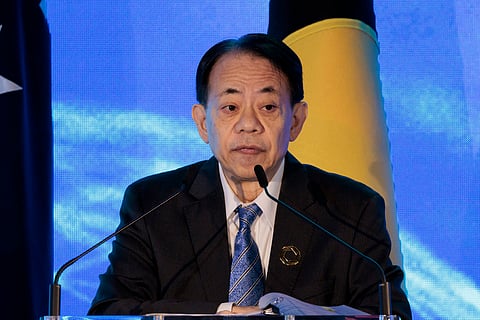
- NEWS
- the EDIT
- COMMENTARY
- BUSINESS
- LIFE
- SHOW
- ACTION
- GLOBAL GOALS
- SNAPS
- DYARYO TIRADA
- MORE

The Asian Development Bank on Monday committed to provide $10 billion in climate finance for the Philippines starting next year until 2029.
This was announced by ADB president Masatsugu Asakawa at the Conference of the Parties or COP28, a climate change forum held this year in Dubai, United Arab Emirates.
"I am pleased to announce that ADB will program $10 billion in climate finance for the Philippines under the new country program we are developing with the government," he said.
COP28 aims to reduce global carbon emissions as the main contributor to climate change which causes extreme drought, flooding and forest fires.
"Under the new strategy, ADB will support low-carbon transport, renewable energy, the development of carbon markets, flood management, resilient coastal development, food security, and adaptive health and social protection," ADB said.
To accelerate climate change mitigation, ADB said it will be expanding partnerships with various sectors to secure funds for climate action.
"ADB will also continue efforts to mobilize additional climate finance from the private sector, co-financing partners, and other sources."
According to the 2023 World Risk Index, the Philippines is the most vulnerable to natural disasters with a high risk score of 46.86 out of 100.
UN funding
As this developed, the Department of Finance pressed the speedy distribution of a $100-billion minimum funding for climate change-mitigation projects for developing countries each year under the United Nations sustainability goal.
In a statement Monday, the DoF said the fund will be part of the New Collective Quantified Goal on climate finance which is slated to be launched next year.
"The New Collective Quantified Goal on climate finance should be established without further delay," Finance Secretary Benjamin Diokno said last Sunday at the 2023 United Nations Climate Change Conference in Dubai.
Since 2022, climate and socio-economic data from developing countries have been studied through the High-level Ministerial Dialogue consisting of 183 parties. Their insights and recommendations are then noted at the Conference of the Parties which monitors the Paris Agreement.
This requires countries to reduce carbon emissions toward a global average temperature of less than 2 degrees Celsius or close to the pre-industrial level.
Philippine weather bureau Pagasa last month said a "stronger" El Niño or dry season is possible next year as the sea temperature in the Pacific Ocean continues to rise over 1.5 degrees Celsius.
The Conference of the Parties will be conducting another series of four technical dialogues next year for its annual climate report.
Diokno said these efforts should ensure transparency, accessibility, predictability, and efficiency of the multi-billion climate fund.
"The clarity of this new goal will define the predictability of our climate actions. Finally, we must collectively commit to deliver real progress in setting up the New Collective Quantified Goal or NCQG in 2024," he said.
